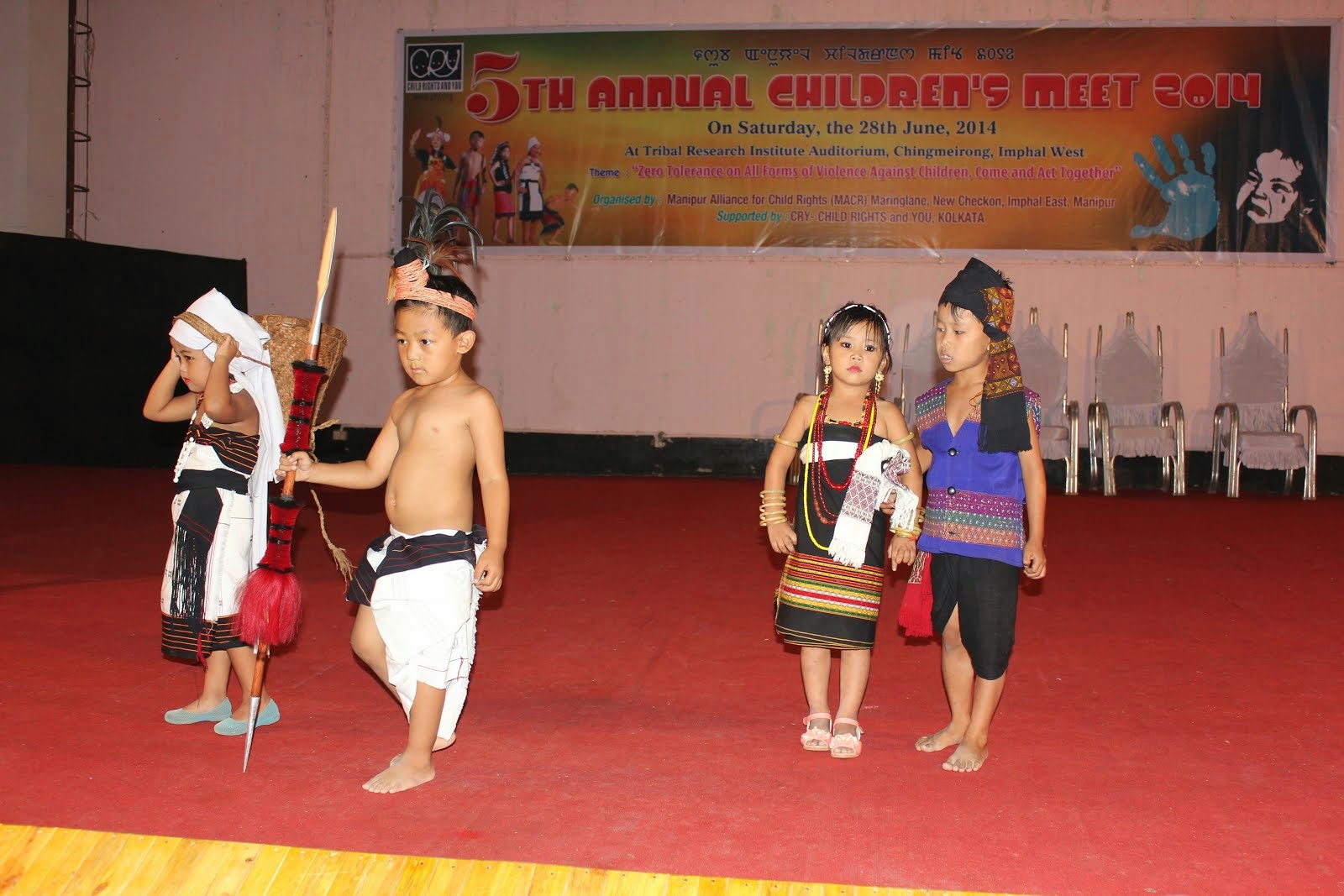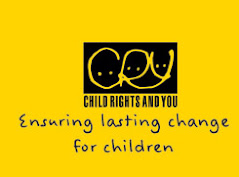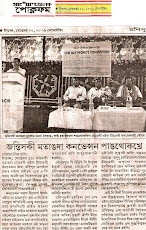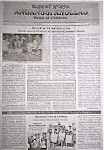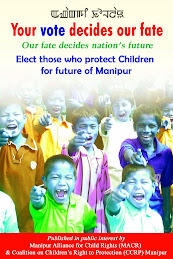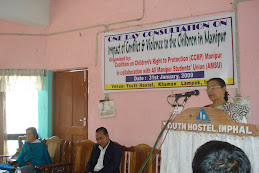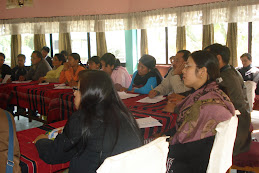Sunday, January 31, 2010
Lack of departmental coordination costly: Jayenta
This was disclosed by state education minister L Jayentakumar at the inaugural function of 20 days state level teachers’ training on visual impairment organised by SSA, SMA Manipur, today at the conference hall of SSA, Babupara, Imphal.
The education minister further maintained that the present law and order situation has also an adverse impact upon the young students adding the state can be well developed only when there is a tranquil atmosphere in the society.
Ten years programme of SSA was supposed to begin from 2000-01 but it began very late in Manipur in 2003-04 owing to certain disturbances, Jayentakumar said adding the state had already lost nearly three years of this visionary programme of educating the children but fortunately the central government has accepted the extention of SSA project for another three years in the north-eastern states.
He further stated that “education for all” was just a provision which comes under the directive principles of state policy, but with the enactment of “Right to Education” bill in 2009 education has become a fundamental right of every citizen, whether normal or disabled.
In the present competitive era, Human Resource has become a major asset of the country and this has be to formed collectively by the people, he noted.
The disabled persons have a special place in the society and they should be encouraged to do constructive works in the society, he added.
The minister also announced construction of a special school consisting of all modern infrastructures at the premises of Wangkhei Boys’ School within this year.
Today’s inaugural function was also attended by Ranjan Yumnam, under secretary education (S), Dr. Prem, state project director SSA Manipur and Ng. Roman, FC/AO- SSA Manipur.
Ukhrul children home dry of state grant
The only government aided children home of Ukhrul district located at Alungtang was found to be on holiday with all the children sent out on leave since December 23 last year.
According to the members of management committee, the state government has not sanctioned the grant-aid for the last eight months.
The members of management committee have been contributing regularly to keep the home functional but from the last week of December the home ceased to function mainly due to financial constraints.
They said that all the 25 children at home had to be sent out on leave on the pretext of Christmas and other village festivals and added the home would function again after receiving the grant-aid from the social welfare department.
A joint application of all the eight government aided homes of Manipur has already been submitted to the social welfare department urging for timely release of grant-aid and other funds along with the implementation of Integrated Child Protection Scheme (ICPS) in the state, the members noted.
Assistant coordinator of CCRP, Athokpam Chinglemba asserted that non release of grant-aid for running children homes by the state government is a violation of survival and protection rights of the children.
CCRP also visited the primary schools of Koso and Leishi village of Phungyar assembly constituency. These two schools were established long back in the 1960s but the government has not taken up anything for the development of the schools. The schools have no proper building and infrastructure and lack the necessary teaching staff with just one or two teachers.
The villagers stated that education in not possible in their villages and so the parents have to send their wards to Ukhrul town or Imphal for education. The poor children who cannot study in towns are often engaged in agrcultural works thereby depriving their right to education, they added.
However, a change can be seen in the village education system in the last two years with the initiative of Participatory Action for Sustainable Development Organisation (PASDO) which is taking up the communitization of education programme under the sponsorship of MISERIOR, Germany, they noted.
The village education system has been revived to some extent with the induction of such programme. The village primary schools which were once defunct are now functioning with about 25 students. The welfare and development of the schools have been entrusted to the village education committee (VEC) with some financial support from PASDO, said H. Thotchuilla, executive secretary of PASDO, Ukhrul.
CCRP also interacted with the officials of district administration and social activists during the two-day visit.
Child Development Project Officer (CDPO) of Ukhrul block, Timna Hongray stated the Integrated Child Development Scheme (ICDS) is being taken up effectively in the district with about 800 anganwadi centres and 200 mini anganwadi centres functioning actively in the district.
The honorarium of workers and helpers along with the required nutritional items of the anganwadi centres are dispatched regularly from the department but there are reports that the anganwadi workers are facing great inconvenience during transaction at the bank as the clearance takes nearly one month, she maintained.
Regarding the sub-standard food items being supplied to the anganwadi centres, she said the food items are supplied by FCI and so the department has nothing to do with the quality of the supplied items.
Sub-divisional Police Officer (SDPO) of Ukhrul, Wungpam Kashar maintained that there are lots of child related issues in the district like drug abuse, trafficking and child labour but the people are unwilling to consult and take help from the police.
The police also needs to be sensitized on Juvenile Justice Act for safeguarding the child rights but at present the role of police in juvenile cases is limited due to lack of observation home and non-functional of the juvenile justice board (JJB) which is supposed to handle the cases of juvenile delinquency, the SDPO noted.
Chairperson of Child Welfare Committee (CWC), Ukhrul district, Gajendra Prasad Mohanty maintained that protection of child rights is a very complicated issue having social and economic implications.
Non-functional of government schools may be termed as a major factor for high rate of school drop-out in the Ukhrul district which again leads to various other social issues of child delinquency, child labour, drug abuse and even trafficking, he noted.
Drug abuse is on the rise amongst children who have come to the town from far off villages for studying. They stay in rented houses without any parental supervision and guidance and as a result most of them begin to use narcotic drugs considering as a fashion and from peer pressure, Gajendra stated.
Also many girls from the villages have abandoned their homes in search of lucrative jobs in metropolitan cities like Delhi, Mumbai, Chennai etc. and in many cases they were found in prostitution, he added.
All social issues related to child rights can be resolved only when the Juvenile Justice Act is implemented effectively for care, support and protection of children in the state, the chairperson of CWC maintained strictly.
Wednesday, January 27, 2010
National panel to take up child trafficking issue
NEW DELHI, Jan 27 – The National Commission for Protection of Child Rights (NCPCR) is rushing a team to Chennai to take up the issue of trafficked children from Assam and Manipur. The decision to despatch a team to Tamil Nadu came following pressure from NGOs to institute a Central Bureau of Investigation (CBI) inquiry on the large-scale trafficking from Assam and North-Eastern States.
Chairperson of the NCPCR, Shanta Sinha told newsmen that a team has been assigned to visit Tamil Nadu to take up the issue with the State Government.
The Commission is also going to convene a meeting of the North-Eastern States and the destination States to work out a coordination plan for State to State mechanism. “We are concerned about the North-Eastern States,” said the chairperson.
Meanwhile, a delegation of Shakti Vahini and Bikalpa Dhara also met the chairperson with a demand to institute an inquiry and take necessary action.
In a memorandum to the Ministry of Home Affairs, the two NGOs called for a CBI probe into the whole issue of trafficking.
Trafficking from the North-East India and Eastern Himalaya region is continuously on the rise and needs a detailed investigation. There are all the possibilities that organised gangs have started operating in the area to traffic women and children.
Since these crimes are spread over different States it would be beneficial that this investigation is done by federal agency like the CBI, the NGOs said.
It was also pointed out that the Chennai incident is not an isolated case, in July last the Kolkata police had rescued 25 North-East children who were going towards Andhra Pradesh.
Similarly, there was a media report about the plight of 1600 children who had been shifted to schools in Karnataka.
On August 5, 2008, Nagaland girls were rescued from traffickers in Malaysia. One trafficker was caught in Nagaland but nothing happened.
“These are very disturbing trends,” said Rishi Kant of Shakti Vahini.
At least 76 children hailing from Manipur and Assam were rescued by Child Welfare Committee, Kanyakumari, Tamil Nadu from a children’s home in Magappair, Tamil Nadu.
This is the second time that CWC had rescued trafficked children from Manipur in Tamil Nadu.
All the rescued children were rescued from an unregistered orphanage called Bedesta Blessing Home located at Kanyakumari, Tamil Nadu.
Earlier, the CWC claimed to have rescued 17 from a Children Home in Magappair, Tamil Nadu few days back.
Reports have it that Bedesta Blessing Home lacked both infrastructure and enough food to feed the children and the crackdown was done by the members of CWC of Tirunelveli district, Tamil Nadu.
Out of the 76 children, 54 of them (all boys) belong to Manipur while the remaining hail from Assam, the source said adding the children were staying at BB Home since July, 2009.
Tuesday, January 26, 2010
Guns and widows
Insurgency-related incidents have left many women widowed in Manipur. Sonia Sarkar looks at their plight | ||||
When men in her neighbourhood return home every evening after work, four-year-old Nalini still remembers that Saturday afternoon two years ago as if it was just the other day. Preparations were on in full swing for a cousin’s wedding in her house in Singjamei Chingamakha Chongtham Leikai in east Imphal in Manipur. Her husband, Choingtham Hem Singh, a government officer, had gone to Paona Bazaar, the busy market hub in Imphal, to buy a wedding gift. The gift was never bought. The shop that he entered was blown up, allegedly by an underground group of militants. “He was at the wrong place at the wrong time,” says Nalini. When you travel in and around Imphal, you come across many women who have been widowed in troubled Manipur. They are called gun widows — for they lost their husbands in either militant attacks or at the hands of security forces. According to data jointly provided by the ministry of home affairs and the South Asia Terrorism Portal, an independent agency, 369 people were killed in insurgency-related incidents last year. The incidents widowed some 300 women. Farhana Bibi, 46, is a gun widow too. Her husband, Mohammed Islamuddin, a former proctor of Clearly, the victims of violence in Manipur are not just people who are killed. The deaths leave behind women who are trying to pick up the pieces of their lives. Last year was particularly bloody in Manipur. Nine civilians were killed by unidentified insurgents inside the Keibul Lamjao national park in Khordak Awang Leikai in Bishnupur district on May 11. Exactly a month later, four men were killed when unidentified insurgents opened fire in the What upsets the widows is the fact that even months after the deaths of their husbands, they have no answers about the killings. Shobha Rani still doesn’t know why her 39-year-old husband, R.K. Sanajaoba Singh, had to die. He was allegedly killed by the Manipur police at Waheng Leikai, barely 500 metres from their home at Sagolband in west Imphal, six years ago. The case is pending at the Gauhati High Court — the highest judiciary body for the state. “It is not difficult to investigate the case and punish the killer. But who will do it? The government is not keen to end the violence in the state, and therefore we continue to suffer,” says a tormented Rani. Even her powerful political connections — she is a close relative of former Manipur chief minister R.K. Joychandra — have not helped her. But she is luckier than many others, for Rani did receive an ex-gratia payment of Rs 1 lakh from the state government. Women such as N. Mori Devi, whose contractor husband was abducted and killed by alleged militants four years ago, are still to get any compensation. “Every time I visit government officers, they ask for a bribe. I do not have any savings and there is no one to support me financially. Where do I get the money from,” asks Mori Devi, who runs a tea kiosk on the highway at Kakching in Thoubal district, 70 kilometres from Imphal, to support her two children — a 12-year-old boy and a six-year-old daughter. Corruption is a scourge that many gun widows complain about. Hoikhovok Serto of Phunchoingjang village in Churachandpur district has paid every rupee that she had saved over the last 14 years to government officers as bribes in the hope that she’d be financially compensated for her husband’s death. “I even sold the two acres of land that I owned,” she says. “I was promised a job for one of my eight children — but we have got nothing so far,” laments Serto whose husband, a village sarpanch, was shot dead, allegedly by members of the Assam Rifles, who mistook him for a militant. Though the Union ministry of women and child development runs shelter homes for widows across the state, help has not reached them all. Jinhu Hoikhothim, 32, widow of a social worker, has been staying in a rehabilitation home built by a local voluntary group for victims of the Kuki tribe in Chandel district. She has never been to a government shelter. She collects fuel wood from the forest and sells them to support her three children. But the Rs 300 that she earns every month barely provides them with one square meal a day. She pins all her hopes on a pig that she is raising. “I hope to receive at least Rs 10,000 when I sell it. I will use this money to send my children to school,” says Hoikhothim. Her husband was allegedly killed by members of the National Socialist Council of Nagaland (Issac-Muviah) group after he refused to pay the Rs 2,000 they had demanded from him. That the government has no answers about the killings troubles the widows. Salom Lokeshwari, 26, has no idea who gunned down her husband, Ajit, a driver, two years ago. “Some people said he was gunned down by the Assam Rifles while others said he was killed by militants. His death remains a mystery to us,” she says. Yet, while the reasons differ and the women themselves come from different strata of Manipuri society, they have one thing in common — their never-ending grief and suffering. “Death seems to be the unbiased leveller for these perturbed widows. From educated to illiterate, from rich to poor, from Kuki to Metei — the struggle for survival for these victims is the same,” says Reena Murum, a local activist at the non governmental organisation, Manipuri Women Gun Survivors Network. Not surprisingly, for many who witnessed the ongoing violence for the past few decades, this is a life they had often anticipated for themselves. “Looking at the crisis in Manipur, my husband and I often discussed how we should save every rupee for our two children as life here is too unpredictable. I knew sooner or later destiny would force me to join the thousands of widows of conflict in the state,” says Lokeshwari, as she cuddles her two-year-old son in the courtyard of her house in Thanga village in Bishnupur district. Yet, amidst the agony, many women are moving on with their lives. “I have become stronger now. I don’t have any fears. Now, my only dream is a better future for my child,” says Rani. After all, you can’t kill dreams. |
Rapist-murderers condemned
IMPHAL, Jan 25: Several women organisations and civil society organisations in the state have expressed strongly condemnation to the murder of a women and her teenage daughter after being gangraped at Phayeng in Imphal West.
In a condemnation note, Coaliation on Children’s Rights to Protection (CCRP), Manipur said it was shocked learn that a widow and her teenage daughter were found murdered after being gangraped at Sampha Loubuk in Phayeng.
While asserting that crimes of different nature are frequently happened in the Manipur, the CCRP said such heinous crimes have badly damaged reputation of the Manipuri society which was once honoured by outsiders with respect.
Stating that victims of such heinous crimes are mostly from financially weak families, the CCRP maintained the Phayeng incident has proved it.
The CCRP further said that perpetrator of the heinous crime at Phayeng should be booked and punished severely so that such crimes could not recur in future.
It also appeal government to take all possible help and support to the children left behind by the deceased women.
The Conflict Widow Forum, Manipur has also expressed strong condemnation to the Phayeng incident of kidnapping, rape and murder. It also appeal government to use all its might and power nab culprits involved in the heinous crime and prodive financial support to bereaved children of the victimised family.
The Momnu Eerikkhombee Lup and the Chanura Lamjinglel Kangleipak have also expressed strong condemnation to the Phayeng incident and demanded that government should identify and book culprits involved in the crime.
Children from Manipur and Assam rescued from Chennai “orphanage”
IMPHAL, Jan 25: In yet another sensational rescue of trafficked children, altogether 76 children hailing from Manipur and Assam were rescued by Child Welfare Committee, Kanyakumari, Tamil Nadu from a children’s home in Magappair, Tamil Nadu.
This is the second time that CWC had rescued trafficked children from Manipur in Tamil Nadu.
According to an informed source, all the rescued children hail from Manipur and Assam and they were rescued from an unregistered orphanage called Bedesta Blessing Home located at Kanyakumari, Tamil Nadu.
Ealier, the CWC claimed to have rescued 17 from a Children Home in Mogappair, Tamil Nadu few days back.
The source further disclosed that Bedesta Blessing Home lacked both infrastructures and enough food to feed the children and the crackdown was done by the members of Child Welfare Committee (CWC) of Tirunelveli District, Tamil Nadu.
Out of the 76 children, 54 of them (all boys) belong to Manipur while remaining hails from Assam, the source said adding the children were staying at BB Home since July, 2009.
The source further added that the all the children seem be from families with low income and they were brought to Saranayalayam which is a home for orphans and destitutes.
It also said that the rescued children are now eager to join their respective parents and families.
The source also maintained that the rescued children are part of 150 children brought to Chennai by a missionary few years back but were given away to different destitute homes, one in Bangalore and the other in Kanyakumari due to inadequate funds to run the home.
Stringent inspection norms were laid down by the Tamil Nadu government, following reports of unauthorised gifting of children for adoption in exchange of hefty sum of money in some destitute homes in Tirunelveli district and the raid came in the wake of an inquiry by Kanyakumari police who informed the Juvenile Home Officer and CWC.
Both Juvenile Home Officer and Probationary Officer of Kanyakumari have already approach the Red Cross to assist in identifying the parents of the children, so that they can be handed back to them.
The source further disclosed that three more organizations at Ambasamuthiram and Palayamkottai in Tirunelveli District, Tamil Nadu, lacked adequate infrastructures.
The source further disclosed that all the 17 children from Manipur who were rescued from a children’s home in Mogappair are said to be in safer place now, where they are being treated for injuries and skin infections.
District CWC chairperson P. Manorama disclosed that some of the children still bear signs of abuse and nearly all of them have extensive scabies and they would be treated and arrangements are being made to take them back home.
Meanwhile, the state CID police are on the trail of two Manipuri agents and the director of Reach Home Children Foundation, who is absconding.
Briefing about the matter, director of the state social welfare department told mediaperson that the department is in the initial stage to have the knowledge about the news of rescue of 76 boys hailing from Manipur and Assam in Tamil Nadu. The state social welfare department officials also maintained that the department is trying its best level to bring back all rescued children home at the earliest.
As for the 17 children rescued earlier, the official maintained that all the arrangement for bringing them back has been made and the concerned authority of Tamil Nadu has been urged to send the children back to their native state.
The officials also appealed to concerned parents to inform the department about their children who were sent outside the state in order to prevent critical issues.
Last year, a total of 27 children were rescued from unregistered orphanage home.
However, there has been no report of penalties against culprits involved in trafficking of children though some bookings were made the culprits got free with minor IPC action.

